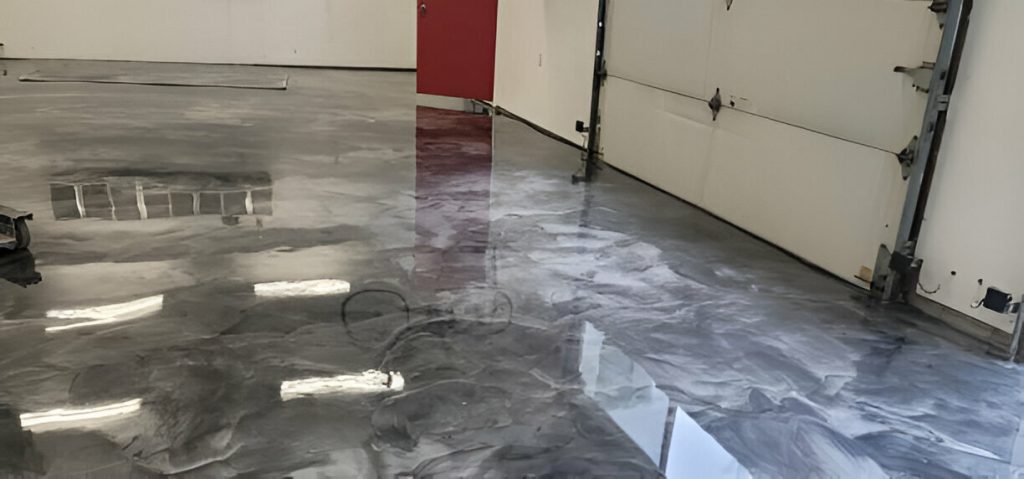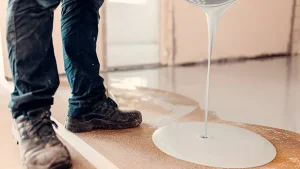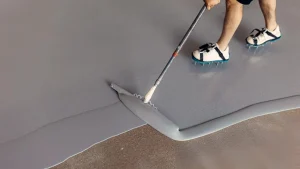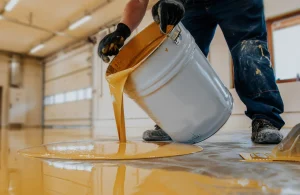
Epoxy flooring is a top pick for homes and businesses because it’s tough, looks great, and is easy to keep clean. Whether it is for a garage, basement, or industrial space, knowing the epoxy flooring price is key to budgeting.
On average, epoxy flooring runs $4 to $9 per square foot. This covers the epoxy material, installation labour, and any extra materials needed.
Choosing epoxy flooring not only upgrades your space but also provides a durable surface that stands up to heavy use.
How Much Does Epoxy Flooring Cost?
For professional installation, epoxy floor coatings normally cost between $4 and $9 per square foot. For a standard two-car garage, you are looking at spending between $1,750 and $4,000.
The cost varies depending on the type of epoxy you choose, the number of coatings, the condition of your concrete, and other specifics at the job site.
If you decide to tackle the epoxy floor yourself, expect to spend around $1.50 to $2.50 per square foot.
Water-based epoxy can be as cheap as $0.50 per square foot, but keep in mind that solid epoxy lasts longer and requires less maintenance. Do not forget to include the cost of concrete patches or primers if your concrete slab isn’t brand new.
Cost Of Epoxy Flooring
| Application | Typical Size Range | Cost Range |
|---|---|---|
| Residential Garage (single car) | 240–360 square feet | $750 to $3,200 |
| Residential Garage (two car) | 360 – 484 sq. ft. | $1,200 – $6,000 |
| Basement | 500 – 1,500 sq. ft. | $3,000 – $12,000 |
| Warehouse | 10,000 – 50,000 sq. ft. | $30,000 – $500,000 |
| Kitchen | 100 – 300 sq. ft. | $400 – $1,500 |
| Driveway | 400 – 800 sq. ft. | $1,200 – $6,000 |
| Patio | c200 – 500 sq. ft. | $800 – $3,000 |
The following are the cost of various application:
1. Epoxy Garage Floor Cost
On average, installing epoxy in a two-car garage costs about $2,500, making it a cost-effective choice for home upgrades that need more than a simple paint job, similar to the average cost to epoxy garage floor. For a one-car garage, two gallons of epoxy suffice for two coats after a primer.
For a two-car garage, three gallons are ideal, and five gallons usually cover a three-car garage.
While epoxy coatings are suitable for some surfaces, they could be better for garage floors. Epoxy can yellow, chip, and suffer from hot-tire pickup, which can spoil your garage floor’s appearance.
2. Epoxy Basement Floor
Installing an epoxy floor coating in your basement typically runs about $2,500. The final cost hinges on your basement’s size, with larger spaces requiring more work and, thus, more money. The condition of your current floor also plays a significant role; more repairs mean a heftier bill. For instance, my friend Roy’s basement needed extensive patching, pushing his total to nearly $3,000.
3. Epoxy Kitchen Floor
The cost of installing epoxy flooring in a kitchen can vary significantly based on several factors, including the type of epoxy used and the specific requirements of the project. O
n average, epoxy flooring costs range from $3 to $12 per square foot, with more complex installations like those using metallic or decorative flake epoxies being on the higher end.
4. Epoxy Patio
Epoxy flooring is also a popular choice for outdoor patios due to its durability and ability to withstand various weather conditions, much like the options available with Epoxy Flooring in Osoyoos BC. The cost for epoxy patio flooring typically ranges from $3 to $7 per square foot.
This includes UV-cured epoxy options that are designed to resist sun damage and maintain their appearance over time.
5. Epoxy Driveway
For driveways, epoxy flooring costs can be higher due to the need for a more durable application that can handle vehicle traffic.
The average cost ranges from $4 to $10 per square foot, depending on the type of epoxy and any additional features such as anti-slip additives or decorative elements.
Epoxy driveways are valued for their high durability, resistance to oil and chemical spills, and low maintenance requirements.
Factors That Affects The Cost Of Epoxy Floor
The following are the factors that affect the cost of epoxy floor:
1. Size Of The Area
When figuring out the epoxy floor coating cost, the size of the space is a big deal. Bigger rooms need more materials and take longer to finish, leading to a heftier bill. For example, covering a large space like a warehouse means you should brace for higher expenses.
While you cannot shrink your area, having spot-on measurements will keep your budget on track.

2. Type Of Epoxy Chosen
When you are laying down epoxy flooring, choosing the right type of epoxy is crucial, especially if considering residential epoxy flooring.
The cost can fluctuate enormously depending on your choice, so it is important to do some homework to find the best fit for your needs and wallet.
Non-solvent, water-based epoxies are usually more budget-friendly than their solvent-based and 100% solids counterparts. However, the latter two have bonuses that might make them a better option for many homeowners.
Consulting an expert can help you nail down which type suits your project best and give you a clearer picture of the costs involved before you get in.
3. Desired Finish
The desired finish seriously influences the cost of epoxy flooring. Basic solid colour epoxy coatings range from $3 to $7 per square foot, providing a smooth, durable surface best for garages and industrial settings.
Decorative options, like adding flakes or chips, increase costs to $5 to $12 per square foot, offering a textured, granite-like appearance.
High-end finishes, such as metallic epoxy, cost between $8 and $15 per square foot, creating a reflective, marbled effect that requires professional installation.
4. Surface Condition
The cost of your floor project largely depends on its current state. If your floor needs extensive prep work, such as diamond grinding, fixing cracks, or removing old flooring like tile or DIY epoxy kits, expect the costs to go up.
5. Diy Vs. Professional Installation
Choosing between hiring a professional for epoxy flooring or going the DIY route can be a real head-scratcher. Both have their benefits and disadvantages, so it is vital to think it through.
DIY might save you some bucks, but it is time-consuming and needs skill. Meanwhile, hiring an expert guarantees a smooth, flawless finish that is both sturdy and good-looking.
You will not stress over blunders, wasted materials, or lousy tools. Also, experts follow strict safety rules and use top-notch stuff for long-lasting results.
Epoxy Floor Cost By Type
| Epoxy Type | Average Cost |
|---|---|
| Solid Color Epoxy | $2 per square foot for materials and $2–4 per square foot for installation labor |
| Metallic Epoxy | $5 and $12 per square foot |
| Flake Epoxy | $6–$8 per square foot |
| Quartz Epoxy | $100 and $200 per square foot |
- Solid-colour epoxy flooring is cost-effective and durable, ideal for commercial and residential applications. Materials cost $2 to $4 per square foot, with an additional $3 to $5 per square foot for professional installation.
- Metallic epoxy floors are known for their stunning, unique finishes that resemble marble or flowing metal. This type of epoxy costs between $9 and $12 per square foot, including installation.
- Flake epoxy flooring incorporates decorative flakes into the epoxy, offering a textured, slip-resistant surface. The cost for flake epoxy ranges from $5 to $10 per square foot.
- Quartz epoxy flooring combines epoxy resin with quartz grains, resulting in an exceptionally durable and slip-resistant surface. It costs between $8 and $12 per square foot.
Epoxy Flooring Vs Other Flooring
Epoxy vs. Concrete
Epoxy makes concrete floors tougher with a sleek, chemical-proof finish. Concrete might be cheaper at first, but epoxy pays off over time. It is easy to clean and shrugs off stains and chemicals, making the initial expense worthwhile.
Epoxy vs. Tile
Tile fights off water and cleans up easily, but it turns into a slip hazard when wet, and dirt loves to hide in grout lines. Epoxy? It’s seamless and slip-resistant, much like commercial epoxy floor paint, and you can jazz it up with custom designs. It is perfect for wet spots like garages and kitchens.
Epoxy vs. Vinyl
Vinyl floors are cheaper and simpler to lay down than epoxy floors, but they cannot handle heavy traffic or chemicals well. Epoxy floors, on the other hand, are built tough and resistant to chemicals, ideal for busy industrial spots and high-traffic areas.
Epoxy Flooring Cost FAQs
How long do epoxy floors take to dry?
Epoxy floors can take up to 72 hours to fully harden. This long wait is important to ensure maximum durability.
Is epoxy flooring cheaper than tile?
Yes, epoxy flooring is typically more affordable than tiled flooring. Also, it offers easier maintenance and a seamless look.
Is epoxy cheaper than cement?
Initially, epoxy flooring can cost more than traditional concrete. However, its long-term benefits and lower maintenance costs make it a cost-effective choice over time.
Conclusion
Epoxy flooring is a fantastic choice for those looking for a sturdy and customizable floor solution. It is especially great in areas prone to spills, stains, and scratches.
A water-based epoxy is friendly for DIY enthusiasts and can be applied using a kit.
However, for the best results, professional application of stronger epoxy types is recommended. Imagine the peace of mind knowing your floor can withstand the chaos of daily life! Also, can a professional epoxy floor last over 20 years?



